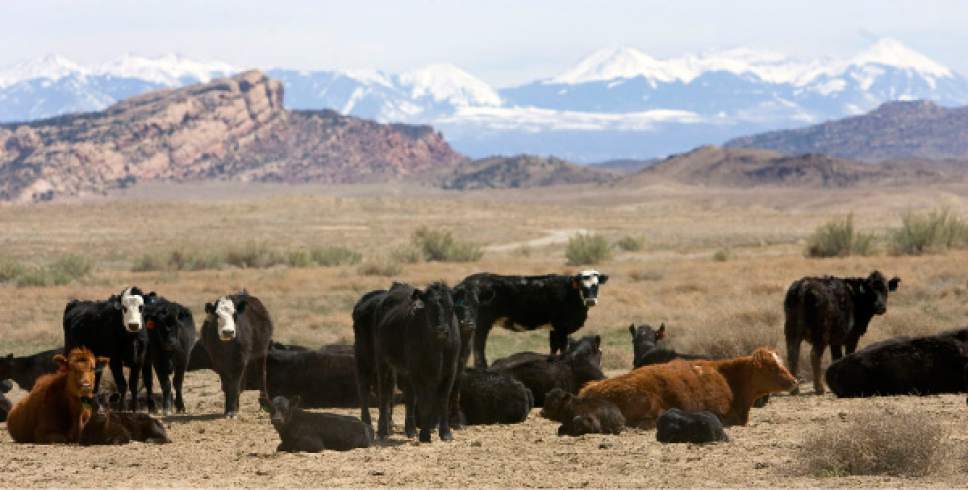This is an archived article that was published on sltrib.com in 2015, and information in the article may be outdated. It is provided only for personal research purposes and may not be reprinted.
A deadline Utah set for the federal government to hand over 31 million acres of public land quietly passed this week with no such transfer, something predicted by both critics and supporters of the state's push for control.
Republican Ken Ivory, a state representative who spearheaded Utah's push, said the passing of the Dec. 31 deadline shows that the federal government doesn't seem willing to negotiate the issue.
"Like in any demand letter, you put a target date so you know where you stand," Ivory said. Utah Republican leaders instead are laying the groundwork to push the issue in court, though it's not clear when the state might file a lawsuit.
Critics say Utah has no legal claim to the land and it's not surprising the federal government didn't simply give up the land.
"It's unfortunate that the Legislature and the governor are going to waste Utah taxpayer's money chasing this pipe dream," said Stephen Bloch, the legal director of the Southern Utah Wilderness Alliance.
U.S. Interior Secretary Sally Jewell, whose department is in charge of about 46 percent of Utah's land "has made it clear that it's a waste of time and resources for Utah to debate" taking over the land, department spokesman Jessica Kershaw said Friday.
"Rather, she's stated that a more constructive discussion should focus around how state and federal partners can work together on the thoughtful management of public lands," she said.
Here's a look at where Utah's land demand stands going into 2015:
THE PUSH
Utah passed a law in 2012 demanding the federal government give up about 31 million acres, about 50 percent of the state, by Dec. 31, 2014. Utah's officials argue the state would be a better manager and local control would allow Utah to make money from taxes and development rights on those acres.
Much of the land Utah seeks is currently controlled by the federal Bureau of Land Management and the U.S. Forest Service. National parks and monuments, military bases and wilderness areas are exempt from the demand.
HOW THEY'LL TRY
Lawmakers are preparing for a potential lawsuit to push the issue in the next year or so. The Utah Legislature has set aside $2 million to prepare a legal fight for the state attorney general to pursue. A state public lands commission is in the process of hiring special lawyers to help them prepare strategies for a lawsuit.
Parker Douglas, the federal solicitor in the Utah attorney general's office, said the office has started drafting a potential lawsuit, but there's no timeline for pursing it. Douglas said the office is waiting to see what progress the state's congressional delegation can make on the issue.
WILL IT WORK?
Ivory and other supporters of the land transfer say the state's legal claim lies in the Utah Enabling Act, which led to Utah's statehood in 1896. Critics have disputed that argument, and the Legislature's own attorneys warned in 2012 that the demand and any attempt to enforce it would likely be found unconstitutional.
If Utah pursues a lawsuit, the state attorney general's office has warned lawmakers they need to avoid flawed theories or inconsistent arguments used by western states in the 1970s and 1980s during a similar push known as the Sagebrush Rebellion.
IF UTAH GAINS CONTROL
Utah lawmakers have pointed to an 800-page report released in December as to how the state could afford to manage the land. The report, which cost $500,000, found that oil and gas leases would allow Utah to afford the $280 million annual cost of managing the land, but only if those prices remained high.
Economists warned that if oil prices remain low, as they are now, Utah would have to increase drilling, raise costs for drilling companies or find other ways to make money. The state would also be at the mercy of national and international changes that could cut demand, such as greenhouse gas regulations.
Ivory said Utah would find ways to cut land management costs while making money beyond just oil and gas. For example, Utah could cut the risk of large, expensive wildfires by opening forests to logging.
Democrats and environmental groups have said it's a pie-in-the-sky scenario for all factors to align to make it sustainable or even profitable for Utah.
OTHER STATES
Montana, Wyoming and Nevada have passed resolutions or requested studies of the legal arguments and costs and benefits of the issue. Idaho passed a resolution in 2013 demanding the federal government hand over control of public land in that state, but a state committee studying the issue now says working with Washington, D.C., for a solution will work better than issuing a demand. The committee is set to issue a recommendation this month about how Idaho should pursue the land.





